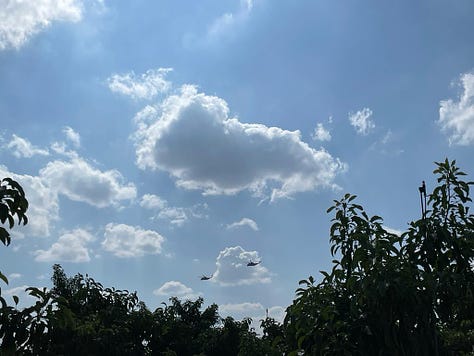The ground war is fully underway. That much is covered by news outlets, so no need to review it here. We’ve included the above video clip released by the IDF of the Head of the Southern Command addressing some of the troops before they rolled over the border. We’ve added subtitles, of course. You can’t help but notice the informal reference to Churchill’s famous speech, as you’ll see.
Today, two glimpses into issues that are all over Israel, plus an important clarification of a story that changed much for the better since we mentioned it.
Here’s what follows:
Bibi’s political woes, even in the middle of a war, are worsening. Those who oppose him are glad to see that, but also worry that what he does and does not do in the upcoming weeks (or months) of war will be shaped not by what the country needs, but by his own political troubles. We’ll see a major Israeli columnist on that below.
A D Gordon, one of early Zionism’s most profound thinkers, believed that the Jewish people could be redeemed by the spirituality of working the land. Most of us lived or arrived here too late for that—until this week. With many men and women called up, with most Palestinians not allowed in to work now and with most of the Thai workers having left Israel after the war began, the farms are desperately short of labor. Thousands of Israeli citizens are volunteering to work the fields, which we did, too, yesterday. A few thoughts about that.
And finally, after the Brandeis University Student Union Senate failed to pass a resolution condemning Hamas (which I noted in a Fox News screenshot), something great transpired. More on that below, too.
First, we look at a meme going around Israel, which to understand requires knowledge of Bill Clinton, Yitzchak Rabin and now ….
Israelis and the Israeli news are mostly staying away from politics. Netanyahu said explicitly that judicial reform is off the agenda. Formerly key players like Yariv Levin (Minister of Justice) and Simcha Rothman (Chair of the Knesset committee on that covered constitutional issues) have disappeared. As in—we haven’t seen or heard from them in weeks. Smotrich is focusing on his the economy but otherwise unheard from, and Ben Gvir rarely pops up. All quiet on the political front … except for one issue, being discussed everywhere, and on virtually every channel:
When Bill Clinton came to Yitzhak Rabin’s funeral in November 1995, he ended his eulogy with words that in Israel are universally known: שלום חבר, Shalom Chaver, “goodbye, friend.”
In the years that followed, Rabin became known as “Chaver,” or friend. And as he was increasingly missed by some, the phrase that became ubiquitous was that which you seen the in the top line of the graphic above, חבר, אתה חסר, Chaver Atah Chaser, which means, “Chaver, we miss you.”
But the vagaries of Hebrew grammar are such that if you change the vocalization from chaser to chasar, the word no longer means “you’re missed,” but rather, “you are missing … something.” Which is where the word on the second line comes in. The word אחראיות, achrayut, means “responsibility.”
So now, together, in this shot getting sent all around Israel media, the photo is not of Rabin, but of Bibi, and the words mean, “Friend, you are missing / [a sense of] responsibility. Ie— it’s time for you to accept responsibility for what’s happened here.” He mostly hasn’t, of course, which is the subject of the column below by Avi Issacharoff.
A DAY AT AN AVOCADO FARM
Like many thousands of Israelis, my son, a friend of his, a friend of mine and I all went southward yesterday, to work on an avocado farm. There were a few dozen of us (there are hundreds of places asking for help, all highly organized on a central website—and after you sign up, you get texts with equipment to bring, hours to work, exact location…)
It was good for the soul—A D Gordon was right. It was good to be away from the TV, separated from the laptop, outside in the sun, and actually doing something for the country. I thought that it was interesting that people spoke almost exclusively with the people with whom they’d come, but even when several of us were working on the same tree, people did not really speak to the others, whom they didn’t know. It wasn’t hostile, it was just clear that this was not a social gathering. We’d come to work, and that’s what we did.
As we were clipping thousands of avocados off the trees for hours yesterday, what was surreal was the sound of intense bombing off to the south, the chug of helicopters above, and every now and then, the sound of an F-35 racing across the sky, all of which you can see if the photos below.
Of particular note:
TOP ROW: note the warning from Waze. “Your destination is an a dangerous area. Use extreme caution.” Not much caution you can exercise out in an avocado grove. If something’s gonna land, it’s gonna land and there’s no where to go. But we were fine.
MIDDLE ROW: [left] two helicopters making their way back from Gaza. They criss-crossed the sky all day (you can zoom in). [middle] Tractor picking up the avocados we picked. We probably filled about four of these “trains” of crates.
BOTTOM ROW: [left] Lunch break. [middle] — F-35 in the air above, while next to you, with the tractor, it’s much lower tech.
For those who are in Israel now and want to volunteer, here’s where you sign up.
We’re heading back, for sure.









Avi Issacharoff is a widely respected Israeli journalist and the co-creator of the Israeli TV series Fauda. He is a Middle East analyst for Walla! and The Times of Israel. Issacharoff speaks Arabic fluently and covered the Israeli-Palestinian conflict, the war in Iraq and Arab countries from 2003-2006 for Israeli Public Radio. In 2002 he won “Best Reporter” award for his reporting of the Second Intifada. He frequently appears on radio and television as a guest commentator.
Issacharoff is the author of, along with Amos Harel, The Seventh War: How We Won and Why We Lost the War with the Palestinians and 34 Days: The Story of the Second Lebanon War.
Issacharoff earned his BA in Middle Eastern studies from Ben Gurion University and an MA in Middle Eastern studies from Tel Aviv University.
Below is the column he wrote (to much acclaim) after Netanyahu tweeted in the middle of the night that he had received no intel about the upcoming war. It was (a) untrue and (b) in very poor taste.. Blaming the Shin Bet and the army in the middle of a war was gross, many people even on the right felt, so the outcry was fierce. Bibi deleted the tweet and apologized.
Here’s what Issacharoff had to say.
“A tweet from a weak and debilitating man, carried by winds blowing Miami”
The hysteria that gripped Netanyahu's office led him to blame the Military Intelligence Directorate and the Shin Bet in the middle of the night. In Gaza, Beirut and Tehran they are celebrating as they the watch of the lack of leadership in Israel.
On March 28, 2002, the morning after the horrible Seder night of the terrorist attack at the Park Hotel in Netanya, the citizens of Israel woke up and realized that the country was at war. 30 murdered, 160 wounded. Then, too, there was an understanding that it was necessary to eliminate the terrorist infrastructure of Hamas, Fatah and other organizations in Judea and Samaria, that it was necessary to clear the area of terrorists and that this would exact a high price. But there was something a little comforting in knowing that the country was then led by a man who could lead it in war. Ariel Sharon was a controversial figure—both in terms of his military conduct in the past and because of corruption cases linked to his name--but there was something about him that made the great majority of us believe that we could follow him; that when he said "After me!", he would indeed lead the country to safe shores, destroy what needed to be destroyed and kill those who needed to be killed.
On October 8, 2023, the morning after the State of Israel lost 1,400 of its sons and daughters and another 230 were abducted to Gaza, there was still a feeling that perhaps this time, for a change, Benjamin Netanyahu would rise above himself and know how to unite the ranks, shake off political calculations and suspicions, and lead the country in its most difficult hour, to accept responsibility and say: “I was wrong, but now is the time to win the war.”
I also believed that we should put our differences aside and go for a unity government; that the wide rift that had been created here, because of this man, must be healed in order to hit Hamas in a way that will never allow it to recover. I believed that this was not the time for protests or demonstrations, and that the Prime Minister should be allowed to strengthen the army and Shin Bet in this difficult time and win.
Then came the signs. At first, he hesitated and for refused to add Benny Gantz, Gadi Eisenkot and others to the emergency government. More and more reports came in that the members of his office, civil servants, were collecting evidence against none other than the heads of the army and the Shin Bet. And above all—he avoided accepting responsibility for the October 7th atrocity. Unlike any junior manager, the CEO of a medium-sized company or the head of a small organization, Netanyahu simply ran away from taking responsibility from, from everything that is taught in the elite units in the army where he served, from everything that is inculcated in the officer school that he also graduated from—to accept responsibility, to say “I was wrong, I made a mistake, it’s on me.” Quite the contrary.
Tonight, between Saturday and Sunday, at 1:10 AM, while the very finest of our soldiers, sons, brothers, fathers, are working inside Gaza and preparing for the expansion of the ground operation there, the Prime Minister published a tweet in which he denied all responsibility, assigning it instead to the head of the IDF's Military Intelligence Directorate Aharon Haliva and Shin Bet chief Ronen Bar. Only eight hours later, when he realized the extent of the shock among the public, did he delete the tweet. Later he admitted the mistake and apologized.
It’s possible that what sparked the hysteria in Netanyahu's office that night was reporter Doron Kadosh's reference at last night's press conference to Amos Harel's publication on Friday, according to which the Military Intelligence Directorate put on the Prime Minister's desk in the months leading up to the war estimates that Israeli deterrence was impaired because of the coup d'état, and that Iran-Hezbollah- Hamas recognized an opportunity to attack.
Netanyahu then attributed this to an attempt at political maneuvering on the part of the military. The fact is, this was published many months ago and was said again and again on every occasion, including here by Yossi Yehoshua [and here]. Even I, in a speech at a demonstration in Kaplan, said that they see the rift in the nation and smell blood. You didn't have to be the head of the Military Intelligence Directorate to get that, just a little understanding of the Middle East.
It is possible that his panic was also influenced by what former Shin Bet chief Yoram Cohen said on Channel 12 yesterday. Cohen, who wears a kippah, and to whom no one can attribute the phrases leftism/elitism/Ashkenazim, said that he and his successors in office - he used the plural to make it clear that not only Nadav Argaman but also Ronan Bar - advised the "political echelon" to launch a pre-emptive strike against the top of Hamas (he used the term "Operation Arifa") [in Hebrew ‘arifat rosh’ means decapitation]. However, the "political echelon", in other words the Prime Minister, was afraid of the consequences of such action and entanglement in the war. These are serious things that can be guessed to have a basis, and Netanyahu also knows that there is no recovery from here.
This morning, even the former head of the Mossad, Yossi Cohen, who was once considered close to the Netanyahu family, said in a conversation with Aryeh Golan on "Kan" what every counselor in the Israeli scouts knows: "You get responsibility at the beginning of the job, not during it. The people of Israel deserve a better system." Cohen is probably not the only one who thinks so. From what Defense Minister Yoav Galant said last night, or more precisely from his ignoring the question of whether he believes in Netanyahu, it can be understood that he also understands that the Prime Minister is looking out for his own personal benefit.
Hamas, Hezbollah and Iran are watching what is happening in the political arena in Israel, they’re watching the weak and weakening prime minister blown away by the wind blowing from Miami, and they are rubbing their hands with pleasure. They think that in the face of such a leader, who runs away from responsibility and shows zero leadership and zero ability to command, that they can win. What they didn't take into account is that this nation is bigger than its prime minister. And in the absence of a leader, a people will rise up and win the war.
BRANDEIS STUDENTS AND PRESIDENT GET IT RIGHT
We made brief mention last week of the fact that the Brandeis University Student Union Senate had refused to pass a resolution condemning Hamas. That was distressing, obviously, but fortunately—and to the moral and intellectual credit of the Brandeis student body—the student union ignored their senate (a mere ten students voted that way) and came out in support of Israel in no uncertain terms.
So, too, did Brandeis’ President, Ronald Liebowitz, in radical contradiction to other notorious recent cases, such as Harvard and Cornell (where the FBI is helping to investigate death threats against Jewish students). Said Liebowitz, as part of his official statement, “We condemn in the strongest way terrorism such as we have seen today perpetrated against innocent civilians; we support Israel's right to defend itself.”
In such a dark time, it is good for the soul to see at least one university and its leadership clearly taking the commitment to “truth, even unto its innermost parts,” very seriously.
As explained above, Shalem College is making use of its financial infrastructure to help the Hamal (which we covered in a previous post) collect funds, and to get 100% of the funds to the Hamal immediately. To support the Hamal, use the link immediately below. There is a place on the web page to note that you want your contribution to be directed to the war effort.
If you’re just joining us, Israel from the Inside typically posts a written column on Mondays and a podcast on Wednesdays. That is obviously irrelevant for the time being.
We’ve delayed all the podcasts that were ready to go, because the people whose stories they tell deserve to tell them when we all have the bandwidth to hear. Hopefully, that will return some day.
In the interim, we’ll post as possible. Here in Israel, there are non-stop funerals to go to, shiva homes to visit, grandchildren to help care for while sons and daughters are in the army, so we’ll see.
Schedules are the least of our worries.
Impossible Takes Longer is now available on Amazon and Barnes & Noble and at other booksellers.
Our Twitter feed is here; feel free to join there, too.
Our Threads feed is danielgordis. We’ll start to use it more shortly.































Yes, that slaughter at the Park Hotel had to be answered with strength. All agree. Yet to this day we do not understand why the more than 1,000 murders of Israeli citizens up to that point did not trigger such a response. Of course, the original Haver and his sidekick Peres took to calling these lost souls "sacrifices for The Peace," but still, for over a year Israelis did not know as they entered a bus, if they would exit that bus still breathing, and not as "pieces for the peace." There was and is, an algorithm of Jewish blood. If you kill a Jew here and there, or even a family, and then wait a bit before murdering again, the Jews will not react. Sharon was one of the leaders who stood by while this Jewish blood-letting increased until the hardest of hard core Israeli peace activists spent all their energy urging the pedophile rapist Arafat to cool it down. "It doesn't look good in the papers," they told him. "You are hurting your own cause." These were Israeli Jews speaking. Noticeably missing were similar calls coming from the ranks of Palestinians.
It may be that leadership consisting of retired generals was at the root of the algorithm. Because of course a military leader needs to be ready to send troops to possible death for the sake of victory in battle. It is a balancing act and the soldiers are the necessary pawns to be maneuvered and sometimes sacrificed--as they have been in all the battles of all the wars ever fought. Our ex-general leadership simply confused civilians with soldiers. All recent leaders of Israel, including the present one, work by this algorithm.
So, civilians are soldiers. That's what Hamas said. It took Hamas acting on this understanding to wake Israel from her sleep--a work in progress.
But it took much less for the press to pounce on Netanyahu as The Guilty One. He is, of course, and he will pay the political price, of course. But what does it say about a leading Israeli journalist who does not pounce on the heads of the intelligence services and the southern military command? Should they command the allegiance of the soldiers in the field? How would a thinking person even think that this is possible? They are operationally responsible for the worst loss of civilian Jewish life since the Holocaust. This is not a political discussion that can be left until after the dust settles. They are not fit to lead. They must step down. Immediately. Leading journalists in Israel should be leading the charge to bring this about.
How can I do that?
If like to volunteer. But I’m in miami
Wow. Tzhal rocks.